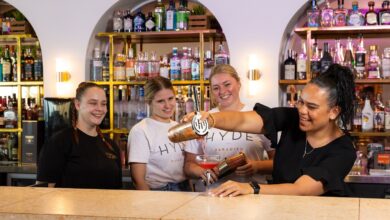
New tourism workforce research finds TNQ operators suffer most
Tropical North Queensland lost both international tourists and international labour - marine and Indigenous tourism impacted most
The impact of the COVID-19 pandemic on Queensland’s tourism industry is extensive and it has caused a range of workforce challenges. New research shows the impact has been immense across the sector but TNQ operators have suffered most hardship.
The Queensland Tourism Workforce Crisis Resilience & Recovery Project led by Associate Professor Richard Robinson, of The University of Queensland, in partnership with Queensland Tourism Industry Council is investigating the impact of COVID-19 on Queensland’s tourism workforce and developing a crisis resilience and recovery plan with the support of the state government.
Daniel Gschwind the Chief Executive of QTIC, Queensland’s peak tourism industry body told us that right now, the tourism industry is navigating very turbulent waters. This is because operators are struggling with sudden border closures and snap lockdowns which cut them off from their customers but when restrictions lift they are then having to deal with a gross shortage of skilled workers.
The sector is fighting two battles, on the one hand, there is no work and on the other hand, when there is work there is no staff.
Mr Gschwind said: “The industry needs to look at ways to keep its skilled workforce and that is why we are doing this important work with Professor Richard Robinson.”
The UQ Business School researcher conducted 15 consultation workshops with tourism industry operators across five Queensland regions – Southern Queensland, Outback Queensland, Tropical North Queensland, Whitsundays and Gold Coast.
Talking about the outcomes Dr Robinson said: “Tourism operators are really struggling to get workers in their regions due to the uncertainty of domestic and international border closures.”
He revealed that Tropical North Queensland operators had suffered the most with a loss of both international tourists and the international labour market, such as working holiday makers. Businesses in marine and Indigenous tourism have been most impacted.
He said: “The key concerns that came up in the consultations were mostly around job security, financial hardship, wellbeing and skilled labour shortages.
“We are working on strategies for recovery and resilience, focused on three industry groups who experience the crisis differently – employees, businesses, and stakeholders – to support a staged recovery from COVID-19 impacts and develop workforce resilience.”
Financial supports like JobKeeper improved work opportunities and a strong sense of community helped boost workforce confidence in mid-2020, but it has since declined again in 2021 due to continuous lockdowns and border closures.
The latest tourism figures show a 48.9 per cent drop in visitors to Tropical North Queensland, while the outback boomed with a record winter season from Australian travellers.
Tourism operators and employees rated job security as the biggest impact of the pandemic.
Operations Manager TNQ of the Entrada Travel Group Hans Ullrich said it was “nearly impossible” to keep staff in the current climate.
“Our staff are highly specialised – for example, we employ diving instructors and boat captains,” he said.
“If lockdowns end suddenly and visitors return, we will struggle to quickly fill these specialised roles that are critical to ensuring our businesses can operate.”
Despite the surge in visitors, tourism operators reported that wellbeing issues and job performance due to labour shortages and insufficient skillsets were still major concerns.
Lloyd Mills, the CEO of the Australian Stockman’s Hall of Fame in Longreach said although his staff were working long hours with limited days off, they were grateful to have the work.
“Maintaining staff motivation and morale is challenging as everyone is worn out from the uplift in visitation from April until July, but our strong culture will get everyone through,” Mr Mills said.
“Should next season’s environment replicate 2021, the same issues for the Outback region will be present – not enough staff to support visitation and full business operation.”
Dr Robinson’s research was conducted in partnership with the Queensland Tourism Industry Council and funded by the Queensland Government’s Advance Queensland scheme.
See the full report here.
Mandy has over 17 years of accommodation and tourism industry writing experience and is Editor of AccomNews & Resort News, Publisher of SchoolNews & Director of Multimedia Pty Ltd. She is a retired registered nurse with a 25-year NHS career that followed a few unforgettable years in hotel housekeeping.







